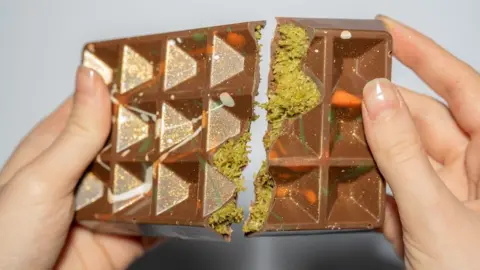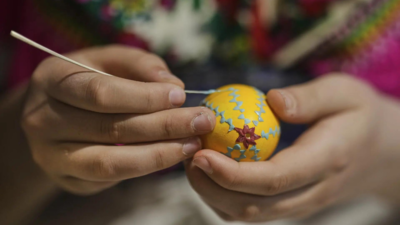From Dubai to Lidl: How One Woman's Pregnancy Craving Sparked a Chocolate Craze

Recently, a unique treat inspired by Middle Eastern flavors has taken social media by storm, leading many to seek it out in the UK and beyond. This phenomenon, dubbed the "Dubai chocolate" bar, is rooted in a rich cultural heritage and a personal story. During a recent holiday in the United Arab Emirates (UAE), I found myself on a singular quest: to find and taste the viral chocolate bar that has captivated the culinary world.
For those who may not be aware, the Dubai chocolate bar features a delightful fusion of chocolate, pistachio, and tahini, all encased in delicate layers of filo pastry. This enticing treat mimics the flavors of the traditional Arab dessert known as Knafeh, which has been a culinary staple in the region. The original chocolate bar, named "Can't Get Knafeh of It," is produced by FIX Chocolatier and has been available exclusively in the UAE since 2022. Its meteoric rise in popularity can be attributed to its viral status on social media platforms, particularly TikTok.
Since its debut, the FIX chocolate bar has become such a sensation that it is only available for purchase for two hours each day, with supplies often selling out in a matter of minutes. This exclusivity has further fueled its desirability. Yezen Alani, co-owner of FIX Chocolatier alongside his wife Sarah Hamouda, expressed to the BBC that the global attention surrounding their creation is both "flattering and humbling."
The story behind this remarkable bar traces back to Hamouda's pregnancy cravings in 2021. As she yearned for the distinctive flavors that reminded her of her roots, she and Alani began developing this unique chocolate treat the following year. Balancing their corporate jobs while launching the chocolate business, the couple aimed to create a product that showcased their combined Western and Arab influences. Alani remarked, "We wanted to create flavors that were inspired by that." This cultural blend plays a significant role in the bar's appeal.
Part of the allure of the FIX chocolate bar lies in its limited availability; it can only be ordered through a food delivery app, making it less accessible than traditional chocolate bars found in supermarkets. A single bar retails for approximately 15, and the company strategically restricts the hours of sale to manage demand and fulfill orders effectively. While exploring shops in the region, I noticed various similar bars labeled as "Dubai chocolate," adorned with images of pistachios and filo pastry. Alani expressed his frustration over these imitations, stating that the prevalence of knockoffs can harm their brand by confusing consumers.
The explosive popularity of the FIX chocolate bar can also be attributed to its social media presence, particularly a viral TikTok video by influencer Maria Vehera, which played a pivotal role in bringing the bar to the forefront of social consciousness. Her video, where she samples the Knafeh-inspired chocolate bar alongside other products from the chocolatier, has racked up nearly seven million likes. The visual appeal of the bar, with its striking orange and green spots atop smooth milk chocolate, combined with the satisfying crunch when breaking off a piece, makes it tailor-made for social media.
Notably, the trend sparked by the original FIX chocolate has led to other brands attempting to capture the market. This includes Swiss chocolate giant Lindt, which has introduced its own version of the Dubai chocolate bar priced at 10 in UK supermarkets. In response to the high demand, Waitrose has implemented a two-bar limit for customers, while other outlets like Home Bargains and Lidl have also begun selling their versions, with Lidls priced at a competitive 4.99. The presence of these alternatives has led to a burgeoning market for similar products, often resulting in the originals exclusivity feeling threatened.
Despite the competition, the FIX chocolate bar remains distinct. It is marketed as a "dessert bar" and, unlike its counterparts, requires refrigeration due to its shorter shelf life, a characteristic more akin to dairy products. This differs significantly from the other bars, which are crafted for longevity. Moreover, the FIX chocolate bar's size is notably larger, nearly double that of the Lindt version, which aligns more closely with conventional chocolate bar dimensions. This variance in size, coupled with distinct taste and texture experiences, solidifies the FIX chocolate bar's unique standing in the market.
In conclusion, the journey of the Dubai chocolate bar from a personal craving to a worldwide sensation illustrates the power of cultural heritage, social media, and entrepreneurship. The story of Yezen Alani and Sarah Hamouda is a testament to how a simple desire can lead to the creation of something that resonates deeply with consumers across the globe.




















